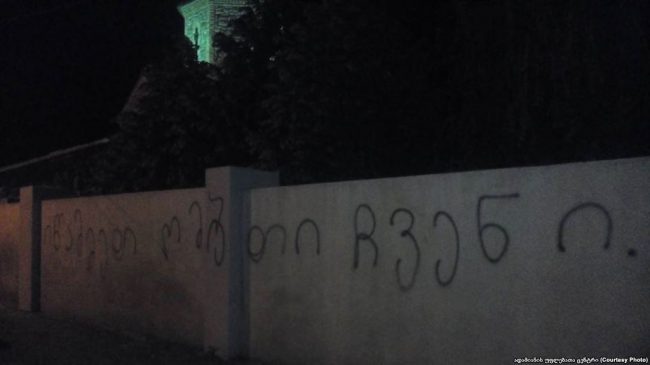
 A Jehovah’s Witness Kingdom Hall was shot at in Gori on 16 May, according to Trialeti TV. The front door of the group’s house of worship was reportedly damaged by a gunshot from a hunting rifle, with a cross and the words ‘believe in our God’ spray-painted on the outside of the building.
A Jehovah’s Witness Kingdom Hall was shot at in Gori on 16 May, according to Trialeti TV. The front door of the group’s house of worship was reportedly damaged by a gunshot from a hunting rifle, with a cross and the words ‘believe in our God’ spray-painted on the outside of the building.
Following the attack, the Ministry of Internal Affairs said an investigation was ongoing and that ‘all possible witnesses’ were being questioned, with a forensic examination taking place. ‘At this early stage of the investigation, it is too early to say anything. We will not rule out any of the possibilities [regarding the nature of crime] until the investigation progresses further’, a spokesperson for the ministry told OC Media. The ministry confirmed on 21 May that the forensic probe was still underway.
The incident was first reported by members of Tbilisi-based rights group the Human Rights Centre. Speaking to OC Media, Aleski Merabashvili, a lawyer for the advocacy group monitoring the case, said it was ‘highly probable it was a case of hate motivated crime’.
The Human Rights Center called for the authorities to identify the culprits and to go beyond property damage charges, treating it as a hate crime motivated by religious intolerance. ‘Aggression seems to be on the rise, as the first incidents involved painting crosses, then leaving messages, and in the most recent case there was a gunshot. The Ministry of Internal Affairs should react appropriately so that we do not face much worse incidents later’, said Merabashvili.
Mikheil Kochorashvili, a lawyer for the group, told OC Media police had talked with several community members but that they currently had no information if any suspects had been identified. The Gori Kingdom Hall, a weekly congregation place for believers, ‘is a religious building that has been the target of several incidents, and the religious content of the messages left on various occasions at the site point to the possibility of religious intolerance as a motive’, said Kochorashvili.
According to him, previous attacks on the Gori Kingdom Hall included a burglary in the Summer of 2015, similar messages and a cross left on the outer wall in December 2016, and damage to the building’s roof in February 2017, allegedly with explosives. ‘Police failed to fully investigate and find the responsible individual or individuals in all these cases’, Kochorashvili told OC Media. There had been no threats made against the community and there was no conflict between the congregation and other local people, he added.
In March 2017, the Tbilisi-based Human Rights Education and Monitoring Center (EMC) reported that there were 122 known crimes against Jehovah's Witnesses in 2013–2016. EMC named the religious community as ‘one of the most marginalised’ in Georgia, and criticised the authorities for their ‘inadequate and ineffective policy’ in investigating crimes committed against the group’s members.
The 2017 Public Defender’s report on the human rights situation in Georgia said that the authorities routinely fail to identify potential hate crimes. The report said that most of the cases reported against Jehovah’s Witnesses to the Public Defender’s Office were related to crimes with a possible religious intolerance motive, in the form of violence directed at them or their property. ‘Unfortunately, law enforcement agencies react to such cases as separate incidents, failing to study the full history of violent instances; cases of physical assault and property damage are not qualified as persecution on religious grounds’, the report said.




 21 May 2018
21 May 2018


